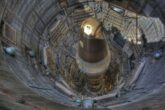July 09, 2014
How worried should U.S. policymakers be about nuclear blackmail?
In recent years, a new generation of scholars has increasingly turned to sophisticated statistical methods to tackle decades-old questions regarding the causes and consequences of nuclear proliferation, including nuclear deterrence, compellence and prospects for crisis escalation. Two of the most widely discussed “large-n” quantitative studies — Todd S. Sechser and Matthew Fuhrmann’s “Crisis Bargaining and Nuclear Blackmail” and Matthew Kroenig’s “Nuclear Superiority and the Balance of Resolve: Explaining Nuclear Crisis Outcomes” — appeared in the January 2013 issue of the flagship political science journal International Organization. Both studies use statistical methods to assess whether nuclear weapons demonstratively provide states with coercive power during international crises.
Based on an analysis of a dataset of 200 “compellent threats” from 1918-2001, Sechser and Fuhrmann argue that nuclear weapons states are no more successful at coercing adversaries than non-nuclear powers. Sechser and Fuhrmann contend that nuclear weapons are useful for deterrence purposes, but because atomic arms are useless for conquest and are extraordinarily costly to employ, these weapons have little utility in compelling adversaries. Nuclear blackmail, in other words, is a myth.
Kroenig disagrees. Analyzing a data set of 52 “nuclear crises dyads,” Kroenig concludes that states enjoying nuclear superiority more often than not succeed in backing weaker nuclear-armed adversaries down. It is worth noting that while the two studies appear to be diametrically opposed, they may not be. Indeed, it is theoretically possible that Sechser and Fuhrmann are right that nuclear weapons are poor tools of coercion, in general, because it is difficult to credibly threaten or use them to compel others, but in crises between nuclear powers, where the inherent risk of nuclear use is higher, nuclear superiority may still matter, as Kroenig suggests.
More from CNAS
-
Time for US nuclear strategy to embrace no first use
No first use is the most meagre of many measures needed to restrain US presidential authority in the nuclear realm....
By Van Jackson
-
If You Want Peace, Prepare for Nuclear War
In a little under three decades, nuclear weapons have gone from center stage to a sideshow in U.S. defense strategy. Since the 1990s, the United States has drastically reduced...
By Elbridge Colby
-
Trump's nuclear views are terrifying: Column
The contours of Donald Trump’s foreign policy are becoming disturbingly clear. Newspapers have labeled his thinking on international affairs "isolationist” and “unabashedly no...
By Mira Rapp-Hooper
-
Elbridge Colby before the House Armed Services Subcommittee on Strategic Forces
Elbridge Colby testified before the House Armed Services Subcommittee on Strategic Forces on adapting U.S. nuclear strategy and posture to a more contested and competitive wor...
By Elbridge Colby


